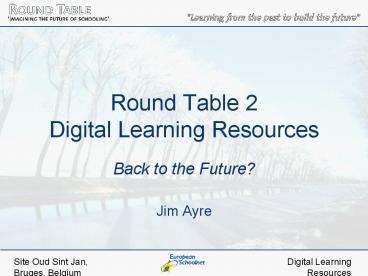Round Table 2 Digital Learning Resources - PowerPoint PPT Presentation
1 / 16
Title:
Round Table 2 Digital Learning Resources
Description:
'We should not assume that everything changes. ... do not change - there has been no ripple in the European gene pool as a result of new ICT. ... – PowerPoint PPT presentation
Number of Views:36
Avg rating:3.0/5.0
Title: Round Table 2 Digital Learning Resources
1
Round Table 2Digital Learning Resources
- Back to the Future?
- Jim Ayre
2
Learning from the past - 1998?
- We should not assume that everything changes. By
and large, children and learners do not change -
there has been no ripple in the European gene
pool as a result of new ICT. - Children learn through doing. A sense of
audience helps, as does high quality mediation to
support, guide and debrief their learning.
3
Gourmet or fast food learning?
- 1998 - a poor quality learning diet found too
often on CD-ROM and the Internet - Children are expected to learn passively through
the provision of standard or uniform content. - Bandwidth needs to be two-way - authoring as
well as browsing, annotating as well as
selecting. - very Web 2.0!
4
Who?
- Making IT Work for SchoolsA Discussion paper
for the EUN Launching conference September
1998Professor Stephen HeppellUltralabUniversit
y of East Anglia UKhttp//rubble.heppell.net/cc
em/pdf/A23906a.pdf
5
2001 Vision
- It will increasingly be necessary to produce
smaller learning modules and objects (based on
open standards) which stand alone as learning
packages and can be localised independently of
the original pedagogical context for which they
were designed. Jorma Kaimio, SanomaWSOY,
eLearning Summit May 2001 - Teachers may even be able to undertake this
localisation process themselves as translation
tools become more user-friendly and
affordable.
6
EUN and Content
- CELEBRATE (IST)CALIBRATE (IST)eCOLOURS
(eContent feasibility project)MELT
(eContentplus)eMapps (IST)iClass (IST)
7
CELEBRATE project 2004
- 1400 Learning Objects, 2400 Learning Assets
tested in 319 schools in six countries - Brokerage System supports federated searching
and content sharing - LOM-based Application Profile
- MoE support for a Learning Resource Exchange
8
CALIBRATE project 2006
9
Visions dont stand still
- Web 2.0 - the read/write web
- blogs, wikis, podcasts, social networking,
folksonomies - Open educational resources
- Creative Commons, MIT OpenCourseWare, OU
OpenLearn - User-generated content is now king?
- Wikipedia, MySpace, YouTube, Flickr
- User-generated metadata?
- Flickr, Furl, Del.icio.us. new MELT project!
10
MELT project Oct. 2006
- MoEs struggle to cope with the demand for
more/better metadata created by trained indexers - Federating repositories no use if we cannot solve
problem of volume metadata creation - MELT - a new metadata ecology involving
- expert indexers
- automatic metadata generation
- folksonomies and social tagging
11
Building a LRE 2006(CALIBRATE MELT)
- Moving towards a publicly available system
offering federated searching - Initially open content with a Creative Commons
licence - A space where MoEs and teachers can share content
but also author and upload content - Adapt, localise and re-use content?
- Original EUN content vision modified by Web 2.0
12
LRE Service 2007
- gt20 repositories in 2007
- 100,000 learning assets
- 37,000 learning resources
- Associate Partners
- Commercial content?
- Sustainability?
13
Personalised Content 2007.
- EC FP7 draft work programme
- - schools (0), education (5) but 15 references to
personalised services, solutions and content - Architectures and technologies for personalised
distribution, presentation and consumption of
self-aware, adaptive content.
14
Is this the future for Schools?
- Research agenda linked to a different vision for
ICT in schools? - ISTAG Scenarios for Ambient Intelligence in 2010
- Annette and Solomon in the Ambient for Social
Learning - mental states of the group are synchronised with
the ambient individual - ICT systems that identify the preferred learning
styles of users, automatically adapt content and
present this to the learner?
15
Key Issues
- What sort of personalised learning/content do
we want in schools? - More active ICT systems and self-aware adaptive
content? - More active, self aware and read/write pupils?
- Can we have both - by 2016?
16
64,000 Question?
- Is the emerging vision for personalised content
the right one for schools? - How does the social dimension of Web 2.0 (social
tagging, social search, social networking, user
created content and content sharing) fit with
this vision?

